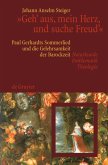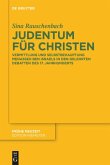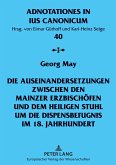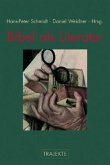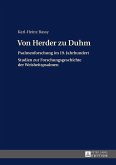The second half of the 18th century brought new currency to Martin Opitzâ??s dictum that poetry is â??concealed theologyâ? at its root. Johann Caspar Lavaterâ??s drama â??Abraham and Isaacâ? (1776) turns the biblical narrative into an exemplary illustration of his unshakeable conviction that man can affect Godâ??s decisions through faith and prayer. In Friedrich Schillerâ??s â??Semeleâ? (1779) the question of Godâ??s credible self-disclosure to humans proves to be a kind of concealed theology.
Das Dictum von Martin Opitz, Dichtung sei ihrem Ursprung nach "Verborgene Theologie", wurde in der zweiten Hälfte des 18. Jahrhunderts unter dem Eindruck von Miltons "Paradise lost" und Klopstocks "Messias" erneut aktuell. Johann Caspar Lavaters Drama "Abraham und Isaak" (1776) gestaltet Genesis 22,1-19 in der Weise neu, dass er, in durchgehend emphatischer Sprache, die Handlung zum Exempel seiner unumstösslichen Gewissheit macht, der Mensch könne "itzo noch" mit seinem Glauben und Gebet auf Gottes Entschlüsse einwirken. - Schillers erstes gedrucktes Drama, die Operette "Semele" (1779), ist die hochpathetische Gestaltung des Ovid entnommenen antiken Mythos. Als das darin verborgene theologische Thema erweist sich die Frage nach der für den Menschen glaubwürdigen Offenbarung Gottes. Und Semeles tödlicher Wunsch, Jupiter schliesslich unverhüllt zu sehen, erscheint auf dem Hintergrund von Schillers gleichzeitiger Anthropologie als Satire auf die "Bestimmung des Menschen", gottgleich zu sein. - Ein knapper Ausblick soll zeigen, dass die Frage, ob und wie die biblische Offenbarung auch in der modernen Lyrik weitergehe, noch immer deren geheimen Sinn erschliessen kann.
Hinweis: Dieser Artikel kann nur an eine deutsche Lieferadresse ausgeliefert werden.
Das Dictum von Martin Opitz, Dichtung sei ihrem Ursprung nach "Verborgene Theologie", wurde in der zweiten Hälfte des 18. Jahrhunderts unter dem Eindruck von Miltons "Paradise lost" und Klopstocks "Messias" erneut aktuell. Johann Caspar Lavaters Drama "Abraham und Isaak" (1776) gestaltet Genesis 22,1-19 in der Weise neu, dass er, in durchgehend emphatischer Sprache, die Handlung zum Exempel seiner unumstösslichen Gewissheit macht, der Mensch könne "itzo noch" mit seinem Glauben und Gebet auf Gottes Entschlüsse einwirken. - Schillers erstes gedrucktes Drama, die Operette "Semele" (1779), ist die hochpathetische Gestaltung des Ovid entnommenen antiken Mythos. Als das darin verborgene theologische Thema erweist sich die Frage nach der für den Menschen glaubwürdigen Offenbarung Gottes. Und Semeles tödlicher Wunsch, Jupiter schliesslich unverhüllt zu sehen, erscheint auf dem Hintergrund von Schillers gleichzeitiger Anthropologie als Satire auf die "Bestimmung des Menschen", gottgleich zu sein. - Ein knapper Ausblick soll zeigen, dass die Frage, ob und wie die biblische Offenbarung auch in der modernen Lyrik weitergehe, noch immer deren geheimen Sinn erschliessen kann.
Hinweis: Dieser Artikel kann nur an eine deutsche Lieferadresse ausgeliefert werden.



